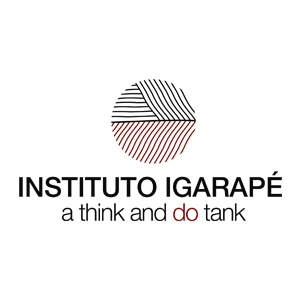Igarapé participates in COP28 with an agenda dedicated to making a shift towards a green and fair economy
On November 17, global temperatures exceeded 2°C for the first time compared to pre-industrial levels. At the United Nations Climate Change Conference in 2023 (COP28) in Dubai, the Igarapé Institute presents an agenda of information and proposals to address the global climate emergency, with a special focus on the Amazon Basin. ‘We aim to generate knowledge and build bridges that allow Brazil and other developing countries to protect their forests and make a green and just economic transition,’ says Ilona Szabó, co-founder and president of Igarapé.
The Igarapé agenda at COP28 has, as its central axis, the vision that the acceleration of the triple planetary crisis – climate disruption, loss of biodiversity, and pollution – demands a change in our relationship with the planet. ‘The future of the planet and its people depends on a global commitment to a green and just transition. Understanding that a healthy planet is a public good benefits the collective humanity,’ points out Ilona, who is part of the High-Level Advisory Board on Effective Multilateralism (HLAB) of the UN Secretary-General.
For the Amazon, in its Climate Security and International Cooperation programs, the Institute has the goal of transforming an ecosystem of environmental crimes into an ecosystem of green enterprises. To achieve this, it has been primarily working on three fronts: monitoring and combating environmental crimes, tracing laundered money in illicit economies; strengthening governance and regional cooperation in the Amazon; and enabling innovative financial mechanisms for nature.
“Environmental crimes do not occur in isolation. They are mostly committed by criminal organizations that handle significant resources, leading to other crimes such as drug trafficking, corruption, money laundering, and homicides,” says Melina Risso, Research Director at Igarapé. The ecosystem of environmental crimes, devastating the Amazon forest, is fueled by illicit flows of resources, largely unnoticed by the surveillance systems of countries in the region. A regional and multisectoral perspective, involving financial oversight bodies, becomes essential to halt the advance of criminal networks.
If the path to reducing deforestation, in which Brazil stands out in this COP, involves dismantling criminal organizations, it is necessary to create conditions for new economies to develop and counter the illicit chains on which many depend in the Amazon region. ‘To change the incentives for deforestation and promote investments in a green economy in the Brazilian Amazon, we must simultaneously work on strengthening the rule of law, expanding public-private partnerships, and reducing risks in investment solutions for green companies,’ says Ilona.
With the presidency of the G-20 and aiming at preparing for COP30 in Belém (PA) in 2025, Brazil has a window of opportunity to consolidate its position of international leadership and secure resources for its green transition and the protection of its biomes – becoming, in fact, a global green powerhouse. ‘We have in abundance the natural resources that the world needs to preserve, such as forests, and those necessary for the world to transition, including strategic minerals and rare earths. What we need is an integrated and coherent vision capable of addressing immediate issues while safeguarding our collective future in the long term,’ says Ilona Szabó.
At COP28, Igarapé organizes, co-organizes, and participates in a series of events with the aim of contributing to and influencing public and corporate policies within this agenda. The Institute will be with leaders from governments and international and multilateral organizations, companies, institutions from the global and national financial market, and partners from civil society.
Learn more details about the Igarapé Institute’s participation in COP28 on its hotsite.
Mais informações: raphael.lima@igarape.org.br /press@igarape.org.br / joao@pensatacom.com
Sobre o Instituto Igarapé
The Igarapé Institute is an independent think-and-do tank that conducts research, develops solutions, and establishes partnerships with the aim of influencing both public and corporate policies and practices in overcoming major global challenges. Our mission is to contribute to public, digital, and climate security in Brazil and worldwide. Igarapé is a non-profit and non-partisan institution, based in Rio de Janeiro, operating from the local to the global level.



